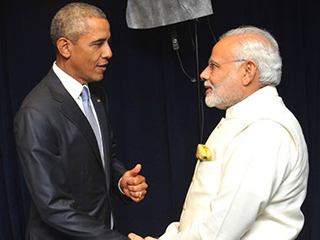Pathankot City


Much is made of Prime Minister Narendra Modi’s personal rapport with US President Barack Obama. One remembers the PM referring to the US President as ‘Barack’ during his visit to India last January.
Thankfully, Prime Minister Modi quickly realized that this kind of familiarity was not part of diplomatic protocol and wisely stopped addressing him by his first name.
But despite the growing warmth in ties between India and the US, reinforced now by Modi’s personal equation with President Obama, Washington continues to bracket India and Pakistan together when referring to risks of nuclear confrontation in the sub-continent.
Former US president Bill Clinton, had once famously called South Asia the most dangerous place on earth as chances of a nuclear flashpoint between India and Pakistan were very real. India does not like to be bracketed with Pakistan on nuclear issues, as it is well known that A Q Khan, the father of Pakistan’s nuclear program was a known proliferator. He passed on nuclear technology to North Korea and Libya. New Delhi’s record in non-proliferation is exemplary.
MEA spokesman Vikas Swarup reacted sharply on Monday to President Obama’s advise to India and Pakistan at the end of the recent Nuclear Security Summit. Obama wanted to “see progress in Pakistan and India, that subcontinent, making sure that as they develop military doctrines, that they are not continually moving in the wrong direction.”
“Yes, we have seen those remarks, Swarup said. “There seems to be a lack of understanding of India’s defence posture. Conventionally, India has never initiated military action against any neighbour. We also have a no-first use nuclear weapons policy,” he added.
New Delhi, which has been on the receiving end of terror strikes from Pakistan, including the latest at the Pathankot air base in January, is angry and hurt that the Americans often misunderstand India’s concerns. In fact in the past, the US and its allies had turned a deaf ear to India’s claims that Pakistan’s state agencies nurtured, armed and funded terror groups to bleed India. It is only in recent years, when the Afghan Taliban targeted NATO and American troops in Afghanistan, that Washington got the measure of Pakistan’s military’s tactics.
India is taking consolation from the fact that President Obama, without naming Pakistan spoke about countries expanding their “nuclear arsenals especially those with small tactical nuclear weapons that could be at greater risk of theft.”
Since the context was the Nuclear Security Summit, the President’s own remark that expanding nuclear arsenals in some countries, with more small tactical nuclear weapons which could be at greater risk of theft sums up the focus of global concern.
Islamabad has admitted that it is making tactical nuclear weapons which can be used on the battle front.
This has naturally rung alarm bells world wide, more so in India as the possibility of them being used in a war with India is very high.
President Obama’s concern is that these small tactical weapons could be stolen and used by Islamic State to devastating effect. The fact that Belgium investigators during a raid in the homes of Islamists, in February, discovered a video tracking the movements of a man working in Belgium¹s nuclear industry. This has opened the frightening possibility of the ISIS wanting to get hold of nuclear material.
Eleven Belgian nuclear workers have had their work authorization taken away because of fears of insider assistance to extremists according to a report in a British daily. This issue was discussed in the recently held Nuclear Security Summit in Washington.
Obama’s reference to military doctrine also mentions India. In New Delhi, there is often talk of the Indian military’s Cold Start Doctrine. Simply put, this means an immediate reaction to terrorist attack from Pakistan, by a counter punitive attack deep inside Pakistan territory. Though India has acted with restraint, the doctrine of punitive strikes is something that hard-liners in India have long favoured. BJP patriarch, L K Advani, as home minister in the first NDA government, often spoke of hot pursuit. This line is in tune with those who want India to have a muscular foreign policy.
Last June, when special forces of the Indian army, raided an NSCN(K) camp, by crossing the border into Myanmar, in coordination with the Air Force, to punish insurgents for a deadly ambush earlier of an Indian army convoy, there was much chest thumping in some circles.
Dark hints were given that Pakistan could face similar fate in case of future terror strikes inside India. Though this has nothing to do with nuclear security, the kind of aggressive talk that emanated from India after the Myanmar operations, worried the rest of the world.
With a history of animosity between the two nuclear-armed neighbours, President Barack Obama’s concern is understandable.
Copyright © 2024 About Pathankot | Website by RankSmartz ( )
)